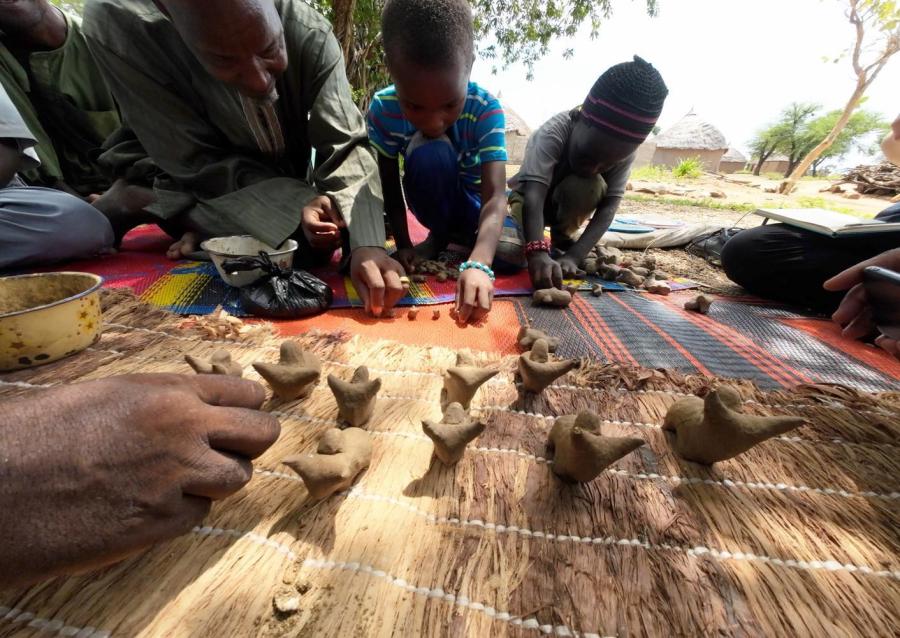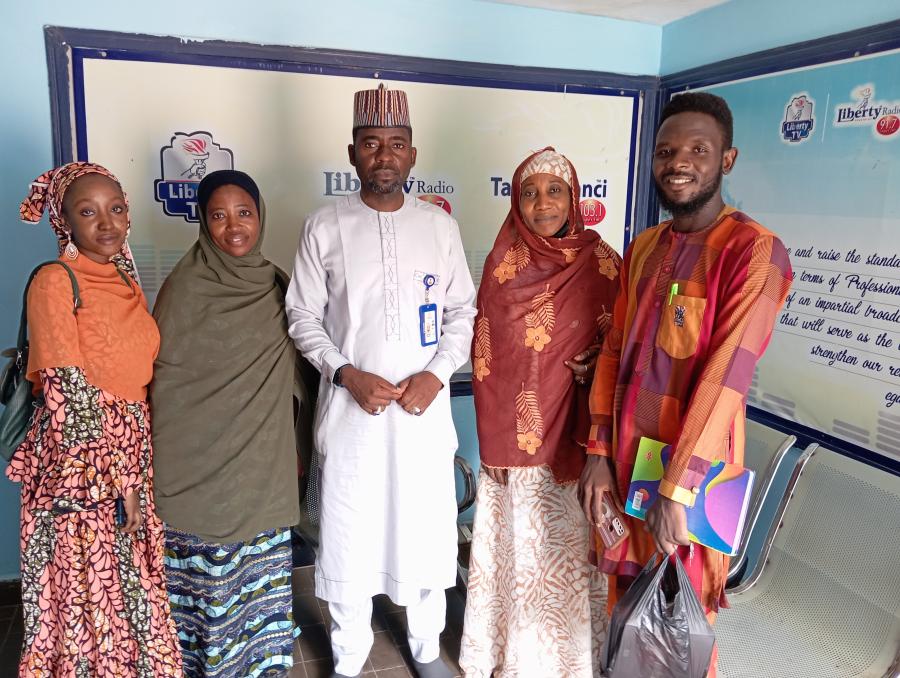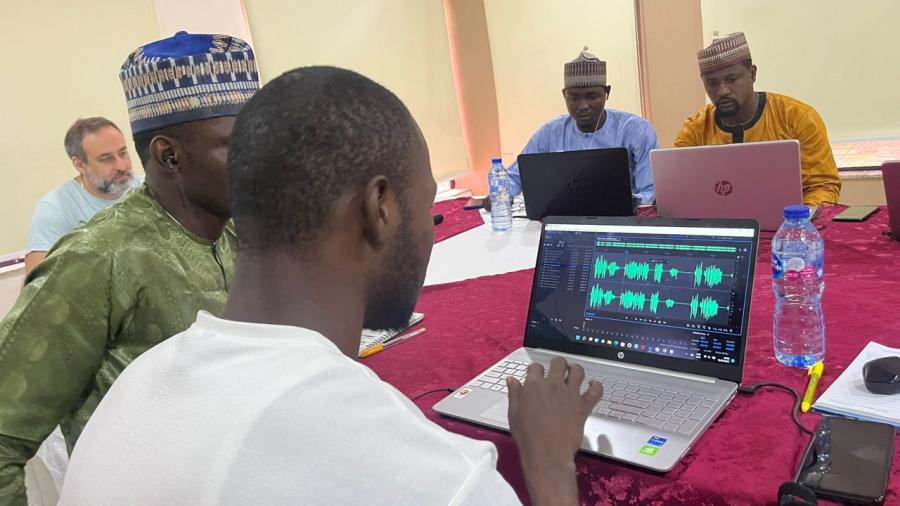For sixty years the story of Protestant missionary activity in Adamawa Province in the upper Benue River Valley of Nigeria is a story of multi-faceted change, mostly negative. Bachama have experienced government administration - both British colonial and national - commercial exploitation, and recently, industrial development. But Danish Lutheran missionaries, affiliated with the Sudan United Mission (SUM), have been the most continuously and pervasively active agents of change. The story of their specific effect on traditional cultural systems reflects the impact of missionary activity elsewhere in Africa.
Bachama is a kingdom of farmers, fishers, and hunters. The king is appointed from one of six royal clans who trace their rights to the throne back to mythical times. The king's office is divinely sanctioned, his personage is hedged with taboos, and his word is absolute.
Bachama are an offshoot of a remnant of the once-powerful Bata states which were subdivided by the Islamic Fulani wars of the 19th century. This factor is surely the single most important in explaining the people's initial general receptivity to Christianity. Throughout nearly 100 years of warfare, Bachama remained independent of the Islamic Fulani, isolated not only from their parent Bata but from some close friends and allies, e.g. Chamba and Kona Jukun; a deep mistrust of all things associated with Islam developed. Christianity, equated with things European, promised strength and security.
Certain events and developments in the history of European contact are necessary to assess the cultural impact of missionary-directed change.
In 1903 the first permanent European settlement, a garrison of troops to protect the Royal Niger Company, was established at the Bachama village of Numan, a convenient way-station in the river trade. This marked the beginning of European law.
In 1910 the Bachama king, Zaro, was killed by a police patrol sent to bring him to answer charges of the instigation of highway robbery. The king's refusal to go to Numan was sanctioned in myth: Each king swore to remain on his side of the river, never to cross. The British installed a new Bachama king at Numan. The sanctity of the old myth was violated, and the king was thereafter responsible both to his people and to the colonial government.
In 1911, the first Danish SUM missionaries arrived and settled.
Desiring high ground for their residential area, in 1926 the British forced the people of Numan to move to a low-lying savannah, a mile to the west. This event is still remembered as traumatic. Numan marked the sacred site of the Bachama-Bata separation; moreover, the move meant abandoning ancestral abodes.
Through the 1920s and '30s, contrasting images of Europeans were formed. Throughout most of west Africa, Europeans were perceived as wealthy, above menial labor, aloof. In Bachama, however, two sets of Europeans were discerned. On the one hand were the aloof government administrators, addressed in Hausa as joji (judge). These were the people who had killed Zaro and forced the evacuation of Numan. On the other hand were the missionaries. These early proselytizers were dedicated and patient. They "moved with the people," ate their food, stayed in their villages, and made earnest attempts to learn local dialects as well as Hausa, the lingua franca. These people were well supplied with the products of an advanced technology, which they were most willing to share with their converts. Each was addressed as likita (doctor).
The distinction between two types of Europeans sharpened during these two decades. Government administrators remained aloof and were seen as increasingly harsh and intolerant; the king became more and more their puppet. At one point in the early 1940s, bothered by the commotion of the widely-attended annual festival at sacred rocks which mark separation of Bachama from Bata, a British official ordered the rocks to be destroyed by dynamite.
The missionaries focused their energies on religious conversion and social deportment, but the effects of their unequivocal brand of Christianity on other traditional cultural systems began to be felt. Being a Christian meant elevation of position and access to luxuries, especially to the greatest luxury of all, and key to success - formal academic schooling. But it also meant no drinking (beer was a symbol of hospitality), no consorting with members of the opposite sex in public (many social festivities, including those associated with religious rites, were occasions for courtship), and no attendance at traditional ceremonies. Polygyny was anathema. Farming, dependent upon cooperative labor and upon the traditional festival cycle, and all cooperative activities, became increasingly problematic as Christians moved out of their traditional compounds and established new communities on the fringes of the villages. Kinship, descent, and residence patterns were disrupted. Respect for the traditional authority of the king began to wane, and societal rifts widened.
By the 1940s and '50s, missionaries found Danish support for their efforts in Africa decreasing. The flow of amenities to Christians slowed, and charges were levied for supplies and medical treatment. The rate of missionary turnover increased. Most new personnel were teachers, doctors, and nurses, all of whom stayed in the Government Residential Area, and few of whom attempted to learn any African language.
Scholarships had been raised to send promising Africans to Denmark and America for further clerical training. These individuals began to return, with stories that "missionaries" (referring to all citizens of the missionaries' home countries) do at home exactly those things which they forbid us to do. Members of the king's African Rifles and other contingents, who had eagerly gone off to fight in the East India campaigns, returned with bizarre stories of other peoples.
By the 1950s and '60s the society was divided between disgruntled traditionalists and increasingly disgruntled Christians. The pulpit of the church in Numan was used by lay preachers to denounce the missionaries as heretical, as destroyers of tradition, as growing rich at the people's expense.
Many people left the church and tried to return to their traditional ways. Some were successful, largely because of the great number of hereditary religious and social positions in Bachama which had been vacated through conversion. Most were successful due to the thorough disruption of traditional social networks and institutions. But the Church excommunicated all who forsook her, forbidding them ever to return to her fold.
Some tried Catholicism. Missionaries in rural Africa, in the manner of colonial powers, laid claim to particular regions and for the most part respected each other's claims. But in 1963 Irish priests of the Order of St. Augustine established a secondary school in Numan. Word spread that these white-robed "fadas" were also Christians, but were more tolerant of traditional social customs - including beer-drinking and polygyny - and held more meaningful rituals. The Catholic mission attracted mainly non-Bachama from outside the district, and the school became successful very quickly.
Local entrepreneurs set up beer shops in the larger villages. Drunkenness, traditionally disgraceful, increased. Crime rose, and the Numan prison was refurbished and expanded to become the largest structure in the town, covering an area greater than the king's compound.
Education proved not to be the key to instant success. Jobs were scarce. The SUM, still the major employer, opened its doors each morning to long lines of job-seekers. But the educated jobless stayed in the larger towns, rather than return to their villages and admit failure to those who had pooled resources to pay for their education.
In 1972, just 60 years after its founding, the SUM in Numan closed, and its activities were taken over by the government. Its story can be read through three generations of people. The elders, who remember when Numan town was moved, represent and serve a significant number of people in remote villages who still cling to traditional ways. The second generation is middle-aged, semi-educated, largely churchless and traditionless, in a tragic limbo. They had forsaken traditional ways and grasped at what the Mission offered, but saw no satisfactory future in clinging to one or returning to the other. The third generation is the ever-optimistic youth, striving for a British-oriented education, cherishing their fondest dreams of being some day able to leave and find gainful employment in the major towns and cities. They are almost totally cut off from their elders and from their traditional heritage; they are typical of the increasing numbers of educated and jobless school-leavers throughout Africa.
Administrators and businessmen focus on the political and the economic. Missionaries focus on what they conceive to be the religious system. And they ignore, or cannot see, the interrelationships with other systems.
Article copyright Cultural Survival, Inc.



